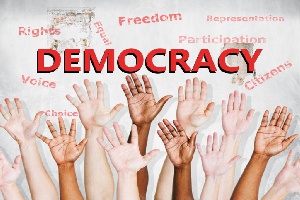Opinions of Monday, 7 January 2019
Columnist: Lawrence Mantey
Compromising democratic principles for political expediency; Service or disservice?
Looking at the slow pace of our development effort since independence and the rampant indiscipline consistently being displayed in the country, it makes people consciously or unconsciously become nostalgic for the periods in our history where military and autocratic regimes reigned.
Those regimes are known for instilling discipline among the populace, and overriding the principles of human rights and freedom to ensure compliance of their leadership.
In Ghana, usually, it is the past military regimes that come to mind. However, there are records of civilian governments that have employed the same tactics as a means to bring about speedy development.
Missed opportunity
Our county missed a great opportunity to establish itself on a sound structural foundation based on popular sovereignty, pluralism and equality, and freedom and liberty. From the beginning of our birth from the womb of colonialism, we failed to safeguard the structures that ensure that it is the people who are ultimate rulers, who determined what government does and, therefore, are protected from government interference in the exercise of their rights.
Unfortunately, this trend has continued from subsequent regimes to the present. At several points in time, Ghanaians became fed up with the wanton disregard and violation of their fundamental human rights and freedoms by civilian regimes that were supposed to know better.
They, therefore, lent their support to military regimes that took over and toppled those governments. With time, however, the military governments found it difficult gaining popular legitimacy for their rule, because their power was clearly based on force rather than popular mandate.
Misgivings
Ghana has experienced such a checkered history because some see the intrusion of popular sovereignty into policy formation of the government as a disadvantage of the democratic political system that undermines the ability of governments to deal decisively and effectively with crisis and policy implementations.
Democracy is subject to inertia. They move slowly on issues because so many disparate elements are involved in decision making, and because officials in democracies are accountable to public opinion and must respond to pressure from a variety of interest groups.
A crisis sufficient enough to arouse the attention of the large proportion of the population may need to erupt in order for a large change in policy to come about.
Compromise
In contrast, authoritarian governments can make decisions more rapidly and have a mechanism to ensure compliance of their policies.
At the beginning of our nationhood as a new independent country, the haste to speed up development and to prove to the world that “the black man is capable of managing his own affairs” blinded our pioneer leaders of the need to place the country on a sound footing from the beginning, where different shades of ideas are harnessed for national development.
Exclusivism and personality cult around single individuals made nonsense of our traditional maxim which keeps reminding leaders that “wisdom cannot be found in only one head” or “A single head does not go to counsel”.
Strategies to suppress dissents and critics of government policies were adopted, sidelining brains and minds that could have contributed to the national development effort.
The cost of this approach to national development where democratic principles are compromised, especially in areas of human rights and individual freedoms, is there for all to see. Fear of retribution led advisors in the past to avoid making policy proposals and also withheld criticism to the ideas proposed by the government.
Our country for long has been denied the opportunity to tap in the ideas and wisdom of people who are erroneously considered “enemies of the state” due to their opposite stand on issues and group affiliations. Either they are confined to prison walls or forced to die with their ideas. Those who fear for their life run into exile into other countries making us miss their ideas and expertise. Over time, these forms of self-censorship make many of our governments less effective in developing innovative policies for national development.
The question
The level of our development at the moment speaks a lot about us as a nation that once played a leadership role in liberating the continent from oppressive colonial rule. In terms of development, many nations in Africa, south of the Sahara, are far ahead of us.
The inescapable question is what went wrong? It seems we have learnt our lessons, and over the past 26 years, the fact that no military intervention has taken place may be a testimony that probably the subsequent governments in the Fourth Republic are doing something right in protecting individual rights and freedoms.
For us the people, probably we have heeded the call to “defend forever the cause of freedom and of rights”, and for seeking the guidance of God to “help us resist oppressors rule (which trample on our rights and freedom) with all our will and might for evermore.”
The writer is with the Institute of Current Affairs and Diplomacy (ICAD)
email: lawmat2014@gmail.com













